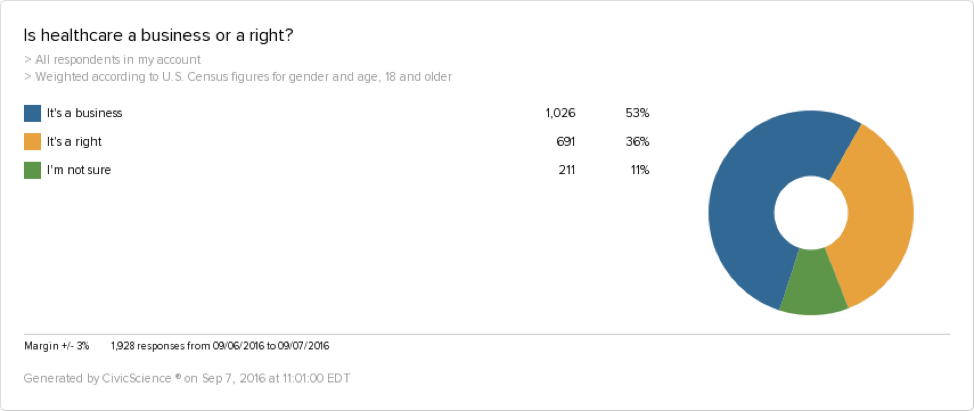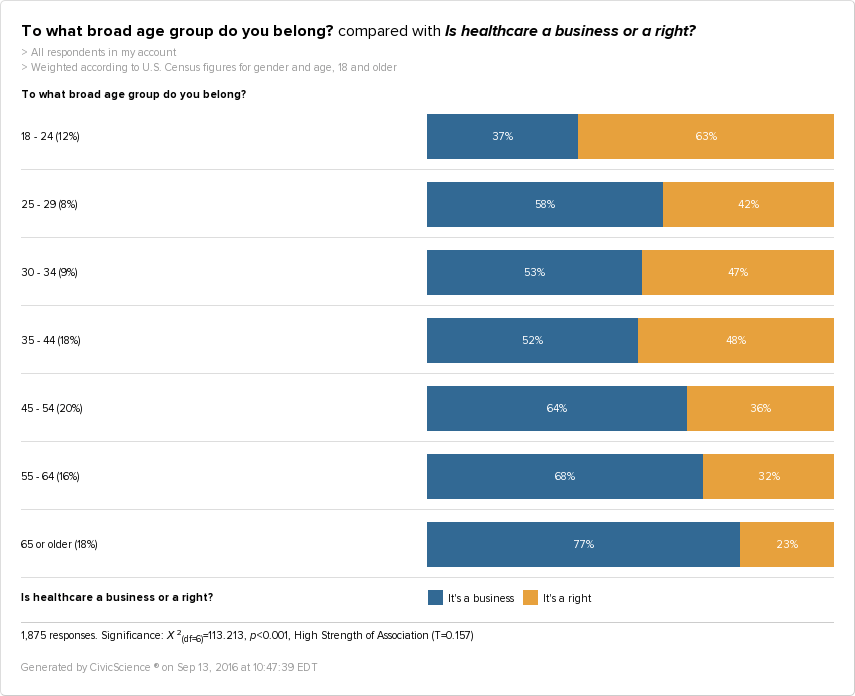With controversies surrounding the dramatic rise of life-saving medication such as the recent Epipen scandal, and the backlash against he-who-shall-not-be-named last year, it seems that more and more people are becoming frustrated with the current health care system.
In response to this national frustration, a Bloomberg columnist recently came out with an article entitled, Healthcare is a Business, Not a Right. This article was met with mixed reactions, and a timely counter-article entitled, Healthcare is a Right, Not a Business. This back-and-forth perfectly illustrates the never-ending battle and confusion throughout the country. For every story about a person who dies due to lack of health care or excessively-priced medical services, there is another about someone who dies due to publicly-run, inefficient health care.
Though there are many on each side, it turns out that more people think health care is a business than a right.
The differences between these groups are fascinating, and go way beyond the overly-simplified, but all-too-common, “democrats think this,” and “republicans think that” narrative surrounding health care.
Health Care is a Business
These people are more likely to be over 55 years old, and consequentially, are more likely to be married, parents or grandparents. They are also more likely to be homeowners and religious charity donors. They are somewhat more likely to be men, and they identify as managing their money very well. Despite the fact that this group is generally older than those who consider a healthcare a right, they are more likely to be reality TV fans, possibly just because they watch more TV in the first place. They are also most influenced by TV ads.
Health Care is a Right
The “Rights” group is more likely to be between the ages of 18 and 34, and are slightly more likely to be women. Unlike the other group, they are more likely to rent their homes, and are more likely to be influenced by social media rather than TV ads. They are more likely to care about the quality of food that they eat, as opposed to the others who care most about service. Although this group is most likely to be employed, they prefer to dine at lower-cost restaurants.
The Generational Gap
Perhaps the most significant difference between these two groups is age – a connection that has been made before – and the corresponding characteristics that go along with age.
As age increases, so does the belief that health care is a business. In part, this may be due to growing up with vastly different experiences around healthcare. Those older than 55 may be able to remember a time without Medicare, while the younger population has only experienced a society with Medicare and certain health-related safeguards. Those over 55 are also more likely to have a different experience with healthcare now, as they are opted into Medicare and its various benefits, and are more likely to use their health care on a frequent basis.
You may be thinking that this correlation is only due to the fact that conservative beliefs tend to increase with age. You’d be somewhat correct.
However, according to Pew only 47% of those 69 and older consider themselves Republican-leaning, as opposed to the 77% of 65 and older individuals who, by our data, believe that health care is a business. Presumably, then, many older Democrats feel that health care is a business as well. What this reveals is that the issue of health care spans beyond party lines.
Why is this Relevant?
I’m glad you asked! It’s no secret that we’re in a bit of a charged political climate (to say the least) and that there are very real ideological differences across the political divide. Yes, health care is a political issue, but a political issue does not mean the only factors are political parties. Parties do not account for each and every difference. They are not monolithic.
In order to engage with this vitally important conversation, and many others, we have to look beneath “Republicans think this” or “Democrats think that” to understand why people believe what they do. We have to see others as people first, and party members second. More strongly considering these underlying traits, such as age and personal experience with health care, may lead to insights and corresponding progress that would be missed otherwise.
If nothing else, we have to reclaim this debate as not just one of Republican vs. Democrat.










